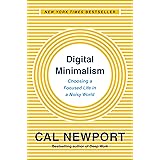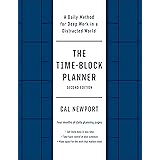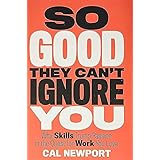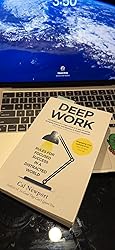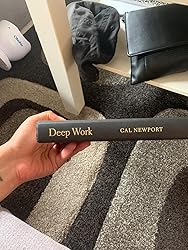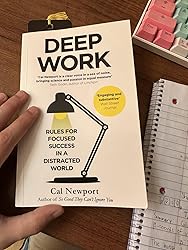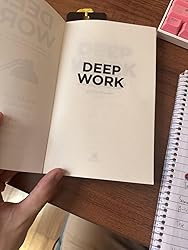Buy new:
-50% $14.42$14.42
Save with Used - Good
$13.24$13.24
Ships from: Amazon Sold by: FoFe' Books

Download the free Kindle app and start reading Kindle books instantly on your smartphone, tablet, or computer - no Kindle device required.
Read instantly on your browser with Kindle for Web.
Using your mobile phone camera - scan the code below and download the Kindle app.

OK
Image Unavailable
Color:
-

-
-
- To view this video download Flash Player
-

-
 6 VIDEOS
6 VIDEOS -

 Audible sample Sample
Audible sample Sample 


Deep Work: Rules for Focused Success in a Distracted World Hardcover – January 5, 2016
Purchase options and add-ons
WALL STREET JOURNAL BUSINESS BESTSELLER
A BUSINESS BOOK OF THE WEEK AT 800-CEO-READ
Master one of our economy’s most rare skills and achieve groundbreaking results with this “exciting” book (Daniel H. Pink) from an “exceptional” author (New York Times Book Review).
Deep work is the ability to focus without distraction on a cognitively demanding task. It's a skill that allows you to quickly master complicated information and produce better results in less time. Deep Work will make you better at what you do and provide the sense of true fulfillment that comes from craftsmanship. In short, deep work is like a super power in our increasingly competitive twenty-first century economy. And yet, most people have lost the ability to go deep-spending their days instead in a frantic blur of e-mail and social media, not even realizing there's a better way.
In Deep Work, author and professor Cal Newport flips the narrative on impact in a connected age. Instead of arguing distraction is bad, he instead celebrates the power of its opposite. Dividing this book into two parts, he first makes the case that in almost any profession, cultivating a deep work ethic will produce massive benefits. He then presents a rigorous training regimen, presented as a series of four "rules," for transforming your mind and habits to support this skill.
1. Work Deeply
2. Embrace Boredom
3. Quit Social Media
4. Drain the Shallows
A mix of cultural criticism and actionable advice, Deep Work takes the reader on a journey through memorable stories-from Carl Jung building a stone tower in the woods to focus his mind, to a social media pioneer buying a round-trip business class ticket to Tokyo to write a book free from distraction in the air-and no-nonsense advice, such as the claim that most serious professionals should quit social media and that you should practice being bored. Deep Work is an indispensable guide to anyone seeking focused success in a distracted world.
- Reading age5 years and up
- Print length304 pages
- LanguageEnglish
- Dimensions5.8 x 1.35 x 8.55 inches
- PublisherGrand Central Publishing
- Publication dateJanuary 5, 2016
- ISBN-101455586692
- ISBN-13978-1455586691
The Amazon Book Review
Book recommendations, author interviews, editors' picks, and more. Read it now
Frequently bought together

Similar items that may deliver to you quickly
 The Deep Work Hypothesis: The ability to perform deep work is becoming increasingly rare at exactly the same time it is becoming increasingly valuable in our economy. As a consequence, the few who cultivate this skill, and then make it the core of their working life, will thrive.Highlighted by 16,900 Kindle readers
The Deep Work Hypothesis: The ability to perform deep work is becoming increasingly rare at exactly the same time it is becoming increasingly valuable in our economy. As a consequence, the few who cultivate this skill, and then make it the core of their working life, will thrive.Highlighted by 16,900 Kindle readers In this new economy, three groups will have a particular advantage: those who can work well and creatively with intelligent machines, those who are the best at what they do, and those with access to capital.Highlighted by 16,432 Kindle readers
In this new economy, three groups will have a particular advantage: those who can work well and creatively with intelligent machines, those who are the best at what they do, and those with access to capital.Highlighted by 16,432 Kindle readers To learn hard things quickly, you must focus intensely without distraction.Highlighted by 16,146 Kindle readers
To learn hard things quickly, you must focus intensely without distraction.Highlighted by 16,146 Kindle readers Human beings, it seems, are at their best when immersed deeply in something challenging.Highlighted by 13,591 Kindle readers
Human beings, it seems, are at their best when immersed deeply in something challenging.Highlighted by 13,591 Kindle readers To build your working life around the experience of flow produced by deep work is a proven path to deep satisfaction.Highlighted by 13,143 Kindle readers
To build your working life around the experience of flow produced by deep work is a proven path to deep satisfaction.Highlighted by 13,143 Kindle readers
From the Publisher


|
|
|
|
|---|---|---|
|
|
|
|

Editorial Reviews
Review
"DEEP WORK accomplishes two considerable tasks: One is putting out a wealth of concrete practices for the ambitious, without relying on gauzy clichés. The second is that Mr. Newport resists the corporate groupthink of constant connectivity without seeming like a curmudgeon."―Wall Street Journal
"As automation and outsourcing reshape the workplace, what new skill do we need? The ability to do deep work. Cal Newport's exciting new book is an introduction and guide to the kind of intense concentration in a distraction-free environment that results in fast, powerful learning and performance. Think of it as calisthenics for your mind-and start your exercise program today."―Daniel H. Pink, author of Drive and When
"DEEP WORK makes a compelling case for cultivating intense focus, and offers immediately actionable steps for infusing more of it into our lives."―Adam M. Grant, author of Originals and Think Again
"Cal Newport is a clear voice in a sea of noise, bringing science and passion in equal measure. We don't need more clicks, more cats, and more emojis. We need brave work, work that happens when we refuse to avert our eyes."―Seth Godin, author of This is Marketing and The Practice
"Cal Newport offers the most well-informed and astute collection of practical advice I have seen for reclaiming one's mental powers."―Matthew B. Crawford, author of The World Beyond Your Head and Why We Drive
"Just when you think you already know this stuff, DEEP WORK hits you with surprisingly unique and useful insights. Rule #3 alone, with its discussion of the 'Any-Benefit' mind-set, is worth the price of this book."―Derek Sivers, founder, Sivers.org
"Here lies a playbook for professionals of all stripes to achieve true differentiation in a crowded talent marketplace. Cal Newport's latest shows why he is one of the most provocative thinkers on the future of work."―Ben Casnocha, co-author of The Start-Up Of You
"Deep work is the killer app of the knowledge economy: it is only by concentrating intensely that you can master a difficult discipline or solve a demanding problem."―The Economist
"This is a deep, not shallow, book which can enrich your life."―The Globe and Mail
"In this strong self-help book, Newport declares that the habits of modern professionals-checking email at all hours, rushing from meeting to meeting, and valuing multitasking above all else-only stand in the way of truly valuable work."―Publisher's Weekly
"[A] worthwhile distraction."―ValueWalk
"A wonderfully entangled, intertwined, and erudite series of strategies, philosophies, disciplines, and techniques to sharpen your focus and dive deep into your work."―800-CEO-READ
"DEEP WORK is now one of my all-time favorite books, and I'm not joking when I say it was a life-changing read for me. I think it can be for you too."―Brett McKay, author of The Art of Manliness
"What emerges most powerfully is the sense that it's wrong to think of deep work as one more thing you've got to try to cram into your schedule. Truly committing to it, Newport suggests, transforms the rest of your time - so you'll crank through shallow work faster, be more present in your home life, and eliminate time wasted switching between tasks. Depth, in short, isn't at odds with a full life - it facilitates it. I'm persuaded."―Oliver Burkeman, The Guardian
About the Author
Product details
- Publisher : Grand Central Publishing; 1st edition (January 5, 2016)
- Language : English
- Hardcover : 304 pages
- ISBN-10 : 1455586692
- ISBN-13 : 978-1455586691
- Reading age : 5 years and up
- Item Weight : 14.7 ounces
- Dimensions : 5.8 x 1.35 x 8.55 inches
- Best Sellers Rank: #2,216 in Books (See Top 100 in Books)
- #11 in Time Management (Books)
- #12 in Personal Time Management
- #111 in Success Self-Help
- Customer Reviews:
Videos
Videos for this product

1:13
Click to play video

This Deep Work Really Worth It? Book Review
Beau Reviews

Videos for this product

5:46
Click to play video

Customer Review: Tried and proven strategies and tactics
M.

Videos for this product

1:18
Click to play video

Customer Review: Will make you 10x more productive!
Alejandro

Videos for this product

2:19
Click to play video

A Revolutionary Approach to Achieving Success
Atomic Readers

Videos for this product

0:21
Click to play video

Highly Recommended - Deep Work by Cal Newport
🛍️ Kumo Shops

Videos for this product

6:33
Click to play video

Think you're not addicted to distractions? Think again
Ori Ben Shalom

About the author

Cal Newport is an Associate Professor of Computer Science at Georgetown University who writes for general audiences about the intersections of culture and technology. He is the author of eight books, including, most recently, Slow Productivity, A World Without Email, Digital Minimalism, and Deep Work. These titles include multiple New York Times bestsellers and have been published in over 40 languages. Newport is also a contributing writer for The New Yorker and the host of the Deep Questions podcast.
Customer reviews
Customer Reviews, including Product Star Ratings help customers to learn more about the product and decide whether it is the right product for them.
To calculate the overall star rating and percentage breakdown by star, we don’t use a simple average. Instead, our system considers things like how recent a review is and if the reviewer bought the item on Amazon. It also analyzed reviews to verify trustworthiness.
Learn more how customers reviews work on AmazonReviews with images
-
Top reviews
Top reviews from the United States
There was a problem filtering reviews right now. Please try again later.
Deep Work is defined as “Professional activities performed in a state of distraction-free concentration that push your cognitive capabilities to their limit. These efforts create new value, improve your skill, and are hard to replicate.” Deep Work is contrasted with Shallow Work, defined as “Noncognitively demanding, logistical-style tasks, often performed while distracted. These efforts tend to not create much new value in the world and are easy to replicate.” Newport’s thesis is that the ability to actually concentrate on hard stuff is becoming rare due to addictive and distracting technologies from Facebook to Buzzfeed to email. Meanwhile, any job that can be replaced by a computer or someone in a developing nation will be, so deep work is actually more valuable than ever.
Deep Work is the knowledge workers’ version of “deliberate practice,” the sort of which leads to expertise as found by K. Anders Ericsson in studies of violin players, golfers, chess grandmasters, and so on. Sheer number of hours of very challenging practice with the aim to deliberately improve one’s skills correlates with the greatest expertise, hence the "10,000 hours rule" popularized by Malcolm Gladwell. Expert violin players practice 3-4 hours a day, whereas mediocre players practice only 1 hour a day or less. Similarly, knowledge workers who spend 30-50% of their work day in completely focused concentration on important, difficult projects produce more value than knowledge workers who spend most of the time checking email, sitting in meetings, and distractedly trying to get a few things done each day.
While Newport emphasizes the benefits in productivity and job security from Deep Work, I think the real benefits are in meaningfulness and life satisfaction. Newport has given a name to something vague I’ve felt was missing in my life. Now I not only have the vocabulary to talk about it, but also a model of how to live a deeply meaningful life in a sustainable manner.
I’ve had a belief that to do a high volume of good quality work, it was necessary to be a workaholic, a belief supported by the exemplars of high achievement in my life. Not wanting to experience the obvious negative effects of workaholism, I’ve instead chosen to be a slacker. Newport presents a golden mean between the extremes of workaholism and slacking, activity and rest; that of spending 3 or 4 hours a day sequestered in highly concentrated periods of challenging mental labor, 90-120 minutes at a stretch, never working after 5:30pm, and managing all this by ruthlessly eliminating the inessential.
This is a noble use of ruthlessness, versus Tim Ferriss’ ethic of ruthlessly cheating-within-the-rules or exploiting international labor markets for personal gain. The inessential ought to be eliminated; doing so ensures room for deep and important work. While Ferriss sometimes talks about eliminating the inessential, he frequently contradicts himself by recommending many unimportant things like expensive and needless supplements, or worthless accomplishments like setting a “world record” for number of tango spins in 1 minute, or cheating at kickboxing. Ferriss emphasizes laziness (“the 4 hour X”) and hacks that allow one to skirt effort, while Newport advocates hard, hard work for which there is no shortcut.
Ultimately Newport’s Deep Work is not simply about doing better work, it’s about living a better life, balancing many competing priorities, determining which technologies aid your most important labor, and valuing your energy and your time as the precious and non-renewable resources they are.
This book a must-read for anyone who does knowledge work of any kind and wants to live a meaningful life in our age of distraction.
That said, this book leaves me with some questions.
Deep Work is a book about finding meaning through work as well as success in life in Late Capitalism. The proposed solution to being outsourced or automated in a hyper-competitive global marketplace is to become indispensable by practicing in a way that leads to profound expertise. However, most new jobs in the economy are in the service sector. Quite a few service jobs won’t allow for Deep Work, for example Starbucks baristas, Amazon warehouse workers, Bus/Uber drivers, call center employees, administrative assistants, and so on. Do these workers have any opportunities to practice Deep Work on the job in a way that cannot be commodified?
Newport at one point suggests that these entry-level jobs do not, therefore the worker should develop deeper skills to increase their opportunities for deep work. But when and where can a service industry worker develop their skills, especially if they are already working full-time or more? The best time to develop skills is while you are being paid, and Newport advocates not doing anything work related after 5:30pm. It seems that the only way for such a person to get ahead would be to add an additional 3-4 hours of deep work into their schedule on top of their 8+ hours on the job, but this would necessarily lead to lower cognitive performance from overwork and inferior rest. Since expertise is about total hours spent in deep work or deliberate practice, an economy where the deepest workers thrive rewards the privileged.
Also by definition if rockstars are some of the only people in a field who will thrive, the system is inherently unjust, privileging a tiny minority while the overwhelming majority suffers. Is Deep Work only for the 1%, and therefore the 99% are destined to lead meaningless and shallow lives? Will Deep Work counter the trend towards increasing inequality, or will it further this disturbing phenomenon, or neither? Is there a way we can increase the opportunities for Deep Work for all workers, not just the professional elite?
Shallow Work is defined as basically busy work that presents a veneer of being productive, whereas Deep Work is the opposite: focusing on very cognitively demanding work that is personally and socially important. But some of the examples of Deep Work involve very showy displays of work such as number of published papers or (I imagine) lines of code written. Everyone knows it is easier to write 5 shallow books than one truly deep one. Could one be a better researcher by publishing fewer, higher quality papers? Does “publish or perish” really create better academic institutions? Does number of published papers make for a good researcher or professor? Does number of citations even make for a good paper?
Many paradigm-changing papers or works were ignored at first. As physicist Max Plank allegedly said, "Science progresses one funeral at a time." Is high craftsmanship always valued and appreciated in a field, or do other values make something more popular or financially lucrative? For instance, a better program might be one which is more elegant, requiring fewer lines of code to do the same thing. But lines of code is a showy metric that appears to be better, despite being more shallow. While Newport's official "lead" metric for success is hours spent in deep work, he also emphasizes the metric of number of academic papers published. Newport’s previous books were on academic success, which is largely defined as getting straight A’s in difficult classes. Is Deep Work just trying to get an “A” in life, or is it truly working on what is important, even if one is not rewarded externally as much as the person who plays to the crowd/rules? Is it “he who dies with the most published and cited papers wins?” or is it “he who writes the most meaningful and deep papers wins?” What if the crowd's values for success in your field are wrong or shallow?
Is Deep Work actually deep, or is it merely technical? It seems like many of the examples involve learning a highly specialized technical discipline, and/or perhaps inventing something new in a highly specialized technical discipline. But is technical skill and proficiency what truly matters in life? To take the example of masterful musicians who K. Anders Ericsson studied: is mastery in musical performance merely a matter of technical proficiency? Clearly without technical proficiency, one cannot reach a level of mastery in music, so some high degree of technical proficiency is necessary. But just as clearly, musical performance that only contains technical mastery is missing something equally as important, making this technical ability insufficient. Newport’s previous book was about developing skill instead of following your passion, but a technical musician who lacks passion makes for a cold and unmoving performance. Is Newport underestimating the importance of passion or heart in expertise because it is more challenging to measure or teach?
I know several people who are back in school right now. All of them spend many hours a day studying very cognitively demanding material in a highly focused manner, but none are superstars. Why is this? One (my wife) doesn’t even have a Facebook or Twitter account, and studies in a very focused manner for hours at a time, and yet is still very slow compared to her son, who can write a nearly good paper in literally 1/10th the time. (He plays hours of video games every day.) Is she lacking some crucial study skill? Another is a PhD candidate in the biological sciences and basically works round the clock. Why isn’t she a superstar in her field given her long hours of difficult study? (She is doing well, but not head-and-shoulders above similar PhD students.) Is she not resting enough or focused enough while she works? Hours spent in a highly focused manner on cognitively demanding tasks is clearly an important thing, but also clearly not the only relevant variable in producing outstanding results. What are those other factors that determine extreme results and are they learnable?
Is Deep actually compatible with More and Fast? In this book, Newport emphasizes being able to produce high volume of work quickly in order to survive and thrive in Late Capitalism. But does this emphasis on More and Fast sacrifice some level of depth that is only possible with Less and Slow? For example, in the psychological sciences as well as in pharmaceutical drug trials, it is difficult to get funding for longitudinal studies that track individuals over long periods of time, but deep and important information is found from these studies that cannot be replicated through short-term studies alone. Because of the lack of these studies (and their expense), we have lots of data on short-term effects of drugs but little information about the effects of these drugs after years of use…and many of these drugs continue to be used for years, such as SSRIs and other anti-depressant drugs. Deep Work does seem to eliminate much of what is unimportant, specifically mindless entertainment and needless technology. A life of Deep Work is certainly more focused and meaningful than one without. There are also some advantages to More and Fast. But what other Deep things are we missing out on by focusing on More and Fast work?
Despite my questions, I found the book very moving and important, and I highly recommend it. In my own life, I will be seriously considering ways to make my daily work life revolve around as much Deep Work as I can sustain.
In this book, Christensen et al, offer a simple but profound insight which they call the ‘Theory of Jobs to Be Done.’ The purpose of this insight is to shed light on why people adopt an innovation in large enough numbers to make it a success, and how to identify innovations that will be adopted.
‘The job to be done’, they assert is the causal mechanism for successful innovation. Using this insight enables companies not only to create but also to predict new innovations that will succeed. Phrasing the innovation in this manner allows for a deep understanding of the customers’ need at a more profound level.
To introduce this concept, the authors describe (among other examples,) the “job of a milkshake.” Why would someone “hire” a milkshake? What “job” is the milkshake expected to perform? “We all have jobs we need to do that arise in our day-to-day lives and when we do, we hire products or services to get these jobs done,” the authors explain.
If you can answer this question, increasing sales is far more likely to be useful than doing taste tests, demographic surveys and purchase studies.
When looking for an answer to this question (an actual case), the researchers were surprised to find that an oddly high number of milkshakes were sold before 9:00 a.m. to people who came to the fast-food restaurant alone. Doing taste tests, demographic surveys and purchase studies would not yield the quality of information that came from asking this question: “Excuse me, please, but I have to sort out this puzzle. What job were you trying to do for yourself that caused you to come here and hire that milkshake?”
It turned out that they had long and boring rides to work and needed something to keep the commute interesting. Coffee doesn’t do the job well because it gets cold too quickly, eating bananas makes you feel too full, but hiring a milkshake does the job well. It is thick enough to sip, lasts long enough, and remains pleasurable through the journey.
Approaching the study from the ‘job to be done’ perspective is quite different to fast-food restaurants asking a patron to give feedback in one of its customer surveys to the question: “How can we improve this milk shake so you buy more of them?” A single dad coming to a restaurant with his young son would answer the survey very differently to the same man when he buys a milkshake for his morning commute. The milkshake is hired for very different jobs, in two very different circumstances.
So how can one identify innovative opportunities if compiling data-rich models only makes businesses “masters of description but failures at prediction”? “We believe Jobs Theory provides a powerful way of understanding the causal mechanism of customer behaviour, an understanding that, in turn, is the most fundamental driver of innovation success,” the authors explain.
So how is Jobs Theory to be applied so that you create products that customers will not only want to buy, but will even be willing to pay premium prices for? Simply put, customers don’t buy products or services: they pull them into their lives to resolve highly important, unsatisfied jobs that arise.
Jobs are never simply about the function of the service or product. The circumstance is central to their definition, not customer characteristics, product attributes, new technology, or trends. Just think of how you would hire a baby-sitter – who would you trust with your children?
“It’s important to note that we don’t ‘create’ jobs, we discover them,” the authors explain. This is a 180 degree shift from viewing innovation as creating what no-one has ever seen before, and then trying to stimulate a need.
Jobs can be discovered in many ways. One is just watching the customers you do—and don’t—already have, and looking for the job that they want done. Do many DIY customers in your hardware store need technical assistance?
You can also learn much about a Job to Be Done from people who aren’t hiring any product or service to do the Job. Airbnb reports that 40% of their “guests” say they would not have made a trip at all, or would have stayed with family, if Airbnb didn’t exist. As such, Airbnb is not in competition with hotels. There may be an entirely new growth opportunity right in front of you.
Are people creating ways of working around a problem or just compensating for it? Banking giant ING saw the segment no bank wants, low net-worth individuals, who want a simple, inexpensive banking facility. They were being chased away by high banking charges and other barriers. ING created ING Direct that has no deposit minimums, is fast, convenient, and secures your money. Of course, you won’t see workarounds if you’re not fully immersed in the context of the consumers’ struggle.
There are probably more jobs people do not want to do than jobs they want to do. Negative jobs are often the best innovation opportunities. Because most people don’t want to go to the doctor if they don’t have to, there are now more than a thousand MinuteClinic locations inside CVS pharmacy stores in thirty-three states in America.
Innovation can also be identified in the unusual use of products. NyQuil had been on the market for decades as a cold remedy, but some consumers were using it to help them sleep, even when they weren’t sick. This led to ZzzQuil, which offers a good night’s sleep without the other active ingredients consumers didn’t need.
Growth can be found where none seems possible. It is dependent on knowing what to look for, and the question to be asked: What is the Job here?
There are gems in this easy-to-read book, with many examples of every point they make. No matter your line of work, this is a clever way to look for new business, but it must be done carefully and slowly.
Readability Light -+--- Serious
Insights High +---- Low
Practical High -+--- Low
*Ian Mann of Gateways consults internationally on leadership and strategy and is the author of Strategy that Works. .
Top reviews from other countries
Deep Work introduces the difference between Shallow and Deepk work. Though I read recommended The Shallow book first, this book does add more details and guide for Deep Work.
Few noteworthy points.
- Deep Work is a Good Work.
- Right to protect your attention.
- Process to evaluate Networking Tools, and Quit them as needed.
- Fix scheduled mindset.
- Sender Filter
Many ideas suggested on the book are worthy enough to try.
Recommend to pass on to next generation, as they are going to need this big time. And, worthy of reread.





